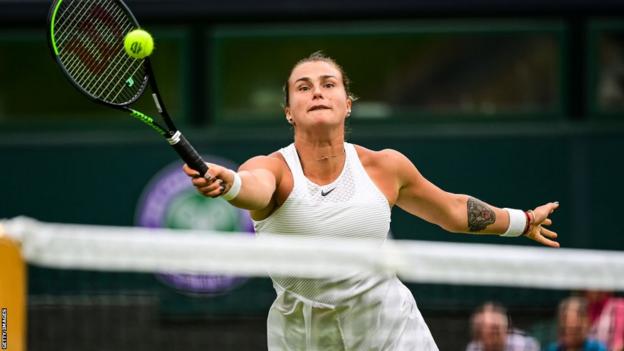Wimbledon is set to donate more than £500,000 to Ukraine relief after the “difficult decision” to lift its ban on Russian and Belarusian players.
The All England Club (AELTC) and Lawn Tennis Association (LTA) will also fund accommodation for Ukrainian players.
Russians and Belarusians were not allowed to play last year in response to Russia’s invasion of Ukraine.
Chairman Ian Hewitt said lifting the ban did not lessen the AELTC’s “total condemnation” of the invasion.
Wimbledon and British tennis’ governing body the LTA were punished for their stance last year by the WTA and ATP with heavy fines and the removal of ranking points, and overturned the ban last month.
“This was an incredibly difficult decision. I personally say that I found this probably the most difficult decision during my chairmanship,” Hewitt, who is standing down at the end of this year’s championships, told the annual Wimbledon spring news conference on Tuesday.
Announcing a series of financial measures to support Ukrainians in an initiative being funded in partnership by the AELTC and LTA, Hewitt said £1 for every ticket holder would be donated to Ukrainian relief, which could amount to more than £500,000.
He also said the AELTC and LTA would pay for two hotel rooms per Ukrainian player in the Wimbledon main or qualifying draws for the whole grass-court season.
Those players will also be invited to practise on the Wimbledon or Surbiton courts during that time, while 1,000 Ukrainian refugees will be invited for a day at the Grand Slam, which runs from 3 to 16 July.
Russians or Belarusians wishing to play at Wimbledon must sign a declaration indicating their neutrality, that they will not demonstrate any support for the war or receive financial backing from their states or companies linked to them.
Flags from either country or any other symbols of support will also be banned from the grounds.
Several players have already signed the declarations but organisers did not give any indication of how many or whether the rules had deterred any players from entering.
“We listened very much to the feedback from last year,” AELTC chief executive Sally Bolton said. “And that feedback from the [Russian and Belarusian] athletes was that they wanted the choice to be able to sign the declaration.
“We’ve spent a significant amount of time engaging with those players to…
Click Here to Read the Full Original Article at BBC Sport – Tennis…

